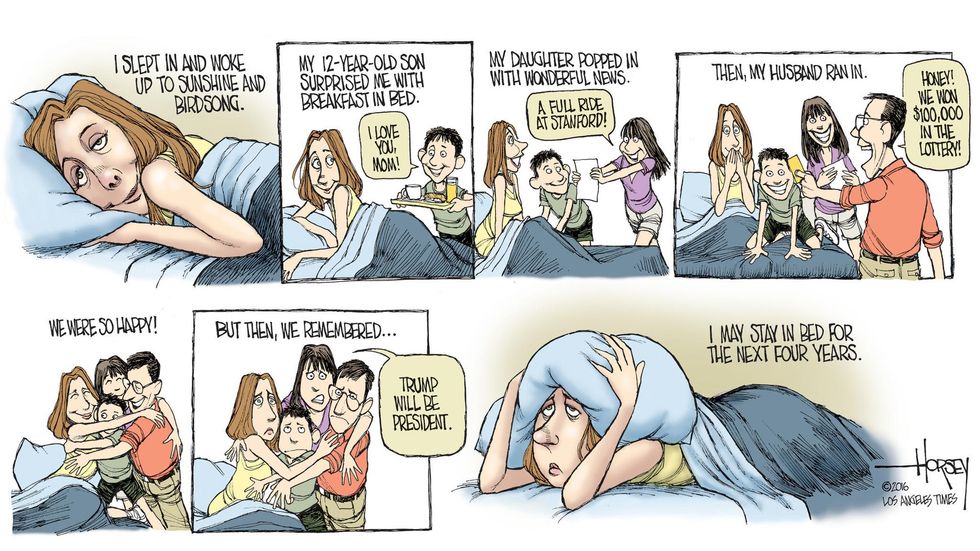I have never seen anything quite like the grief being felt by the majority of American voters who did not vote for Donald Trump.
Back in 1980, there was disappointment among Democrats when Ronald Reagan won. In 2000, after the long Florida recount and the intrusion of the Supreme Court into the decision, there were plenty of upset people who thought Al Gore, not George W. Bush, deserved to be president. But the losing voters in those elections were not despondent. They were not breaking out in tears weeks later. They were not waking up each morning with feelings of dread about what was to come.
This time it is different and, in my experience, unique. This is not simply a case of Hillary Clinton supporters being bad losers. For most of those who feel traumatized by what happened on Nov. 8, this is not about the candidate who won the popular vote, yet lost the election. It is about the candidate who was picked as president by the electoral college on Monday. People are mourning because the fate of their country will now be in the hands of an intellectually disinterested, reckless, mendacious narcissist.
It is not just Democrats. There are plenty of conservatives and Republicans among those feeling depressed. Their party has been captured by a man who has no bedrock belief in any principle; a man whose only allegiance appears to be to himself.
David Frum, conservative Republican and ex-Bush speechwriter, has been very explicit about what he expects from the Trump White House: corruption and authoritarianism. In a series of tweets the day after the election, Frum predicted that Trump will engage in "massive self-enrichment" and, once the media and Democrats begin investigating and criticizing his actions, he will retaliate "by means fair or foul," utilizing the powers of the presidency and aided and abetted by a compliant Republican Congress.
"Construction of the apparatus of revenge and repression will begin opportunistically and haphazardly," Frum wrote. "It will accelerate methodically."
No one — certainly no Republican — contemplated such a scenario when Reagan was elected, or when George H.W. Bush or his son took office. Nobody thought a victory by Sen. John McCain in 2008 or Mitt Romney in 2012 would have threatened democracy. This time that concern is widespread and far from irrational, given Trump's words, actions and erratic, bullying temperament.
Those who are troubled by Trump's ascendancy are almost equally distressed by the mindset of their fellow citizens who voted for him. It is understood that most Trump supporters are decent folks, many of whom have been left behind by changes in the global economy. But how can they believe some of the things they believe? In a post-election survey, the Public Policy Polling organization found that 67% of Trump voters think unemployment increased during Barack Obama's presidency while only 20% know the opposite is actually true. Though the stock market skyrocketed to record heights during the Obama years, 60% of those who voted for Trump either do not know it or do not believe it. Forty percent of Trump voters also say their candidate won the popular vote, even though Clinton now leads in the count by nearly 3 million ballots. Perhaps that is why friendly crowds at his victory rallies continue to cheer when Trump makes the obviously false claim that he won the election in a landslide. They do not know better.
And then there are those among the Trump loyalists who buy into clearly insane ideas, like the fool who shot up a pizza shop in Washington, D.C., because he believed fake news stories that had identified the restaurant as the headquarters for a child sex ring run by Hillary Clinton. With that muddle-headed level of discernment rampant, it is no wonder Trump gets away with his unending stream of falsehoods.
There have been a number of commentaries written about the need for liberal "elites" to gain a better understanding of those who voted for Trump; the folks in the Rust Belt and rural America who feared for the future because they felt the country they knew was changing too dramatically and leaving them behind. Well, the fear is now on the other side, and not only among so-called elites. It is ordinary Americans of all classes and races who fear that, under Trump, environmental protections will be dismantled, limits on Wall Street greed will be removed, the rights of minorities and women will be undermined and American foreign policy will be run by dangerously unseasoned amateurs with a crush on Vladimir Putin. Such fears are not based on feelings or fake news stories; they are confirmed by the composition of Trump's Cabinet.
In the presidential campaign, the fears of one group of citizens morphed into a powerful anger that Trump harnessed to propel himself to the White House. Now, another set of Americans — a significantly larger group — is feeling profoundly distressed. If their fears are borne out, their anger, too, will become a political force that could upend an election yet to come.
This article by David Horsey appeared in the LA Times on December 21, 2016
This carton by David Horsey was its cover photo.
###
December 24, 2016


